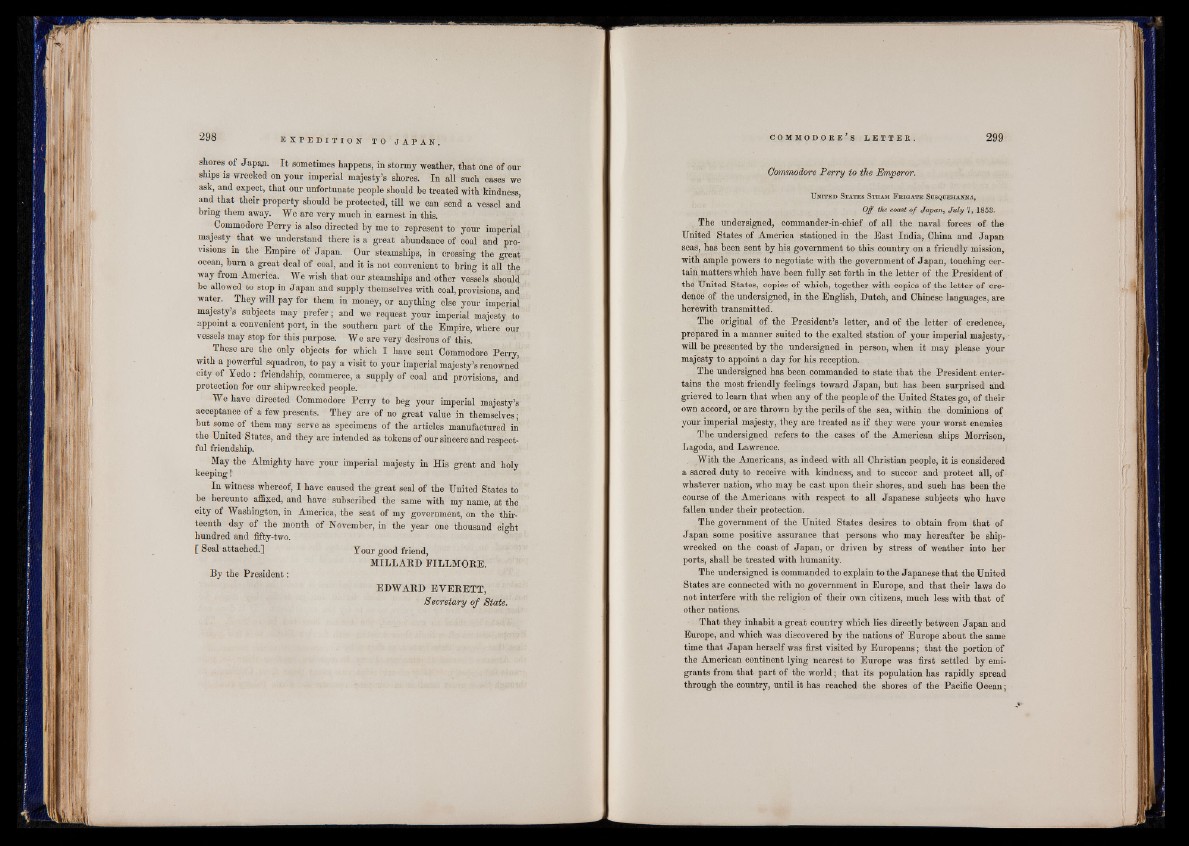
shores of Japan. I t sometimes happens, in stormy weather, that one of our
ships is wrecked on your imperial majesty’s shores. In all such eases we
ask, and expect, that our unfortunate people should be treated with kindness,
and that their property should he protected, till we can send a vessel and
bring them away. We are very much in earnest in this.
Commodore Perry is also directed by me to represent to your imperial
majesty that we understand there is a great abundance of coal and provisions
in the Empire of Japan. Our steamships, in crossing the great
ocean, burn a great deal of coal, and it is not convenient to bring it all the
way from America. We wish that our steamships and other vessels should
be allowed to stop in Japan and supply themselves with coal, provisions, and
water. They will pay for them in money, or anything else your imperial
majesty’s subjects may prefer ; and we request your imperial majesty to
appoint a convenient port, in the southern part of the Empire, where our
vessels may stop for this purpose. We are very desirous of this.
These are the only objects for which I have sent Commodore Perry,
with a powerful squadron, to pay a visit to your imperial majesty’s renowned
city of Yedo : friendship, commerce, a supply of coal and provisions, and
protection for our shipwrecked people.
We have directed Commodore Perry to beg your imperial majesty’s
acceptance of a few presents. They are of no great value in themselves;
but some of them may serve as specimens of the articles manufactured in
the United States, and they are intended as tokens of our sincere and respectful
friendship.
May the Almighty have your imperial majesty in His great and holy
keeping 1
In witness whereof, I have caused the great seal of the United States to
be hereunto affixed, and have- subscribed the same with my name, at thé
city of Washington, in America, the seat of my government, on the thirteenth
day of the month of November, in the year one thousand eight
hundred and fifty-two.
[ Seal attached.]
By the President :
Y our good friend,
MILLABD EILLMORE.
EDWARD EVERETT,
Secretary o f State.
Commodore Perry to the Emperor.
Un it ed States Steam F rig ate Susquehanna,
O ff the coast o f Japan, Ju ly 7, 1853.
The undersigned, commander-in-chief of all the naval forces of the
United States of America stationed in the East India, China and Japan
seas, has been sent by his government to this country on a friendly mission,
with ample powers to negotiate with the government of Japan, touching certain
matters which have been fully set forth in the letter of the President of
the United States, copies of which, together with copies of the letter of credence
of the undersigned, in the English, Dutch, and Chinese languages, are
herewith transmitted.
The original of the President’s letter, and of the letter of credence,
prepared in a manner suited to the exalted station of your imperial majesty,
will be presented by the undersigned in person, when it may please your
majesty to appoint a day for his reception.
The undersigned has been commanded to state that the President entertains
the most friendly feelings toward Japan, but has been surprised and
grieved to learn that when any of the people of the United States go, of their
own accord, or are thrown by the perils of the sea, within the dominions of
your imperial majesty, they are treated as if they were your worst enemies
The undersigned refers to the cases of the American ships Morrison,
Lagoda, and Lawrence.
With the Americans, as indeed with all Christian people, it is considered
a sacred duty to receive with kindness, and to succor and protect all, of
whatever nation, who may be cast upon their shores, and such has been the
course of the Americans with respect to all Japanese subjects who have
fallen under their protection.
The government of the United States desires to obtain from that of
Japan some positive assurance that persons who may hereafter be shipwrecked
on the coast of Japan, or driven by stress of weather into her
ports, shall be treated with humanity.
The undersigned is commanded to explain to the Japanese that the United
States are connected with no government in Europe, and that their laws do
not interfere with the religion of their own citizens, much less with that of
other nations.
That they inhabit a great country which lies directly between Japan and
Europe, and which was discovered by the nations of Europe about the same
time that Japan herself was first visited by Europeans; that the portion of
the American continent lying nearest to Europe was first settled by emigrants
from that part of the world; that its population has rapidly spread
through the country, until it has reached the shores of the Pacific Ocean;